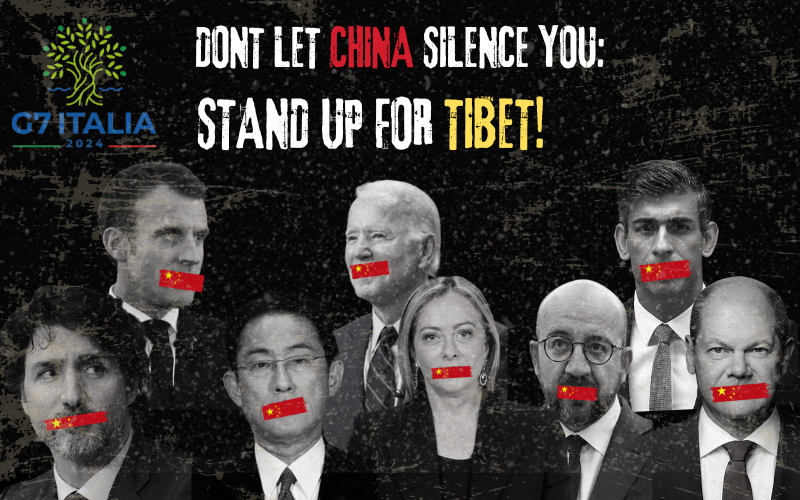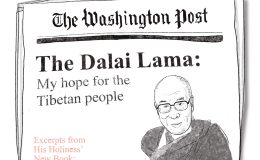New global approach is needed to challenge China’s failed Tibet policies
11 June 2024 – FOR IMMEDIATE RELEASE
[LONDON] Ahead of the 2024 G7 Summit in Italy[1], Tibet campaigners from all seven countries deliver an urgent message to global leaders to ‘Unite for Tibet’, calling on them to jointly tackle China’s repressive occupation of Tibet and Xi Jinping’s relentless crackdown on Tibetans as he attempts to eradicate the Tibetan people’s distinct identity. [2]
China has occupied Tibet for over seven decades, and its rule there is one of the last remnants of 20th-century colonialism. This is epitomised by China’s colonial system of residential boarding schools, in which close to one million Tibetan children [3] have been forced into a highly regimented and restrictive environment, often far from their families and communities, and which is designed to sever them from their Tibetan identity. This system in Tibet has direct parallels to the devastating colonial boarding school systems in countries like Canada and the United States.
China’s occupation of Tibet remains a significant yet often overlooked and unresolved conflict and since Xi Jinping came to power in 2012, there has been a dramatic deterioration of human rights across the entire Tibetan plateau. In February 2024, Freedom House ranked Tibet as the least free place in the world [4], an explicit and alarming charge and another clear sign that global leaders must take stronger action.
Over the past 18 months, multiple UN human rights bodies have raised the alarm at the escalation of human rights violations in Tibet [5], including the colonial boarding school system and six out of seven of the G7 governments also raised the grave situation in Tibet during China’sUN human rights review in January. [6]
The G7 must build on the concerns they raised at the UN. As representatives of the world’s most powerful nations, G7 leaders must take responsibility to address the Sino-Tibetan conflict and push for a lasting solution.
Dott. Claudio Cardelli of Associazione Italia-Tibet:
“Beijing’s policy of destroying culture, the environment, and Tibetan society continues relentlessly. The systematic and cruel work on children, who are seized from their families and indoctrinated in colonial schools; along with the environmental devastation and the forced displacement of entire villages that will be submerged by the gigantic Kamtok Dam in Dege, are the latest examples of a long-term, well-thought-out program aimed at eradicating Tibetan identity, culture and environment. The time has come for the world to mobilise against all this.”
Tencho Gyatso of International Campaign for Tibet:
“The previous rounds of Sino-Tibetan dialogue showed us that China responds to steady, persistent pressure. G7 leaders must understand that they have the power – and the responsibility – to apply this pressure. With one voice, world leaders must tell Beijing that a just resolution to the Tibet issue can only be reached through dialogue with the Tibetans.”
Tenzin Yangzom of International Tibet Network:
“Xi Jinping is showing few signs of reviewing its harsh policies in Tibet and Beijing has tightened its grip on public security with intensive restrictions on communications to cut Tibet off from the rest of the world, and this is exactly why it is so important for world leaders to take action – they cannot allow the situation in Tibet to simply be ignored.”
Yoko Ishii of Free Tibet Fukuoka:
“For far too long, the occupation of Tibet has been overlooked by governments in the bid to tighten relations with China. But year after year Tibet is ranked as one of the worst places for freedom and human rights in the world! We urge G7 leaders to use their standing in the world, to come together to take a united stand on the crisis situation and work towards finding a solution to the Tibet/China crisis.”
Gloria Montgomery of Tibet Justice Center:
“The majority of G7 Governments have repeatedly expressed concerns over China’s extreme repression in Tibet – it’s high time for like-minded leaders to develop common approaches and policies that Beijing cannot ignore. The combined voices of the world’s most prominent leaders can help pave the road for a peaceful resolution to one of the world’s most long-standing injustices.”
Tenzin Kunga of Tibetan Community in Britain:
“Despite the high risk to Tibetans inside Tibet and in spite of the repressive situation, Tibetans continue to resist and to challenge China’s rule. Their struggle for their fundamental rights and their freedom demands international support and a sustainable solution to the conflict. The G7 has a powerful voice and must use it to speak up for Tibet.”
John Jones of Free Tibet:
“From its language and religion, to its environment, to the future of its children, Tibet faces a struggle for its existence. The level of repression from Beijing is matched only by the bravery of Tibetans as they push back. Several of the G7 governments spoke up for Tibet at China’s human rights review in January, but these fine words must not be the end; they should be the first step towards a lasting resolution to the conflict.”
For further information or comments, contact:
Rashi Jauhri, International Tibet Network: +44 7587 094876
Tencho Gyatso, International Campaign for Tibet: press@savetibet.org
Mandie McKeown, International Tibet Network: +44 7748 158618
John Jones, Free Tibet : +44 7591 188383
NOTES TO EDITORS:
- The G7 Summit will be held in Borgo Egnazia, in Italy, in one week, bringing together the Leaders of the seven-member States of Canada, France, Germany, Italy, Japan, the UK, and the US, as well as the President of the European Council and the President of the European Commission representing the European Union.
- Joint Letter to G7 Leaders: https://tibetnetwork.org/g7-joint-letter-2024/
The joint letter calls for further more robust action against China’s flagrant disregard for fundamental human rights and its violent and systematic assault on the Tibetan people. The letter urges G7 states to
a) Echo the UN human rights experts’ recommendations and call on China to immediately abolish the coercive colonial boarding schools for Tibetan children; as raised by multiple G7 States at China’s Fourth UPR in January 2024.
b) Call for an end to all State interference in the selection and installation of Tibetan Buddhist leaders, including any future reincarnation of the Dalai Lama, which must be determined solely by the Tibetan people, following international human rights law. Tibetan people’s right to freedom of religion and belief was raised by G7 states; France, Germany, Japan, United Kingdom and United States at China’s Fourth UPR in January 2024.
c) Press China to immediately stop all megadevelopment projects in occupied Tibet until Tibetans are given the right to free, prior, and informed consent to decide upon the future of projects affecting Tibetan culture, religion, and the environment; and to urgently end the crackdown in Dege and unconditionally release all detained Tibetans. - This equates to more than 80 percent of all Tibetan children from ages 6 to 18 – together with at least 100,000 four and five-year-olds – now estimated to be living in Chinese state-run boarding schools and boarding preschools across Tibet.
Report: Separated From Their Families, Hidden From The World – Tibet Action Institute https://tibetaction.net/colonial-boarding-school-report/ - Freedom in the World 2024 Report, Freedom House https://freedomhouse.org/country/tibet/freedom-world/2024
- Over the past 18 months, multiple UN human rights bodies have raised the alarm at the escalation of human rights violations in Tibet, see https://tibetnetwork.org/un-alarm-human-rights-violations-in-tibet/
- Recommendations at China’s UPR 2009 to 2024, https://tibetnetwork.org/china-upr-tibet/






Leave a Comment